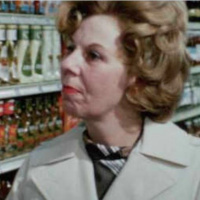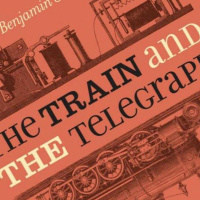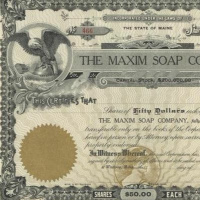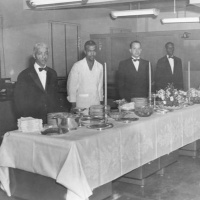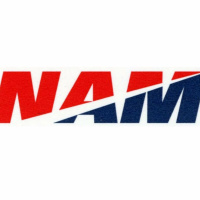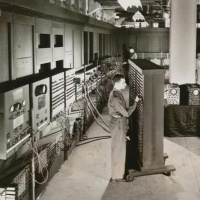Stories From The Stacks
- Author: Vários
- Narrator: Vários
- Publisher: Podcast
- Duration: 79:48:23
- More information
Informações:
Synopsis
Podcast by Hagley Museum and Library
Episodes
-
Racial Segmentation & Market Segregation: The Late-Twentieth-Century Supermarket with James McElroy
03/05/2021 Duration: 28minProgram officer Gregory Hargreaves interviews James McElroy about his dissertation project “Racial Segmentation & Market Segregation: The Late-Twentieth-Century History of the American City Supermarket, 1960-1990.” In support of his research, McElroy, PhD candidate at the University of Minnesota, received an exploratory research grant from the Hagley Center for the History of Business, Technology, & Society. In “Racial Segmentation & Market Segregation,” McElroy offers a social and busines history of supermarkets that links the production and distribution of marketing knowledge with the shaping of urban spaces and communities in the latter half of the twentieth century. The process revealed is one in which market segmentation based upon racialized stereotypes informed the segregation of American cities we live with today. For more Hagley History Hangouts visit us at www.hagley.org/hhh
-
The Train & the Telegraph: A Revisionist History with Ben Schwantes
19/04/2021 Duration: 42minHagley oral historian Ben Spohn interviews Ben Schwantes on his recent book, The Train and the Telegraph: A Revisionist History (Johns Hopkins University Press, 2019). In the book, Schwantes argues that the relationship between the telegraph industry and the railroad industry is much more complicated than previously recognized. While the infrastructure for these two industries often accompanied each other, their business interests and goals did not. As Schwantes points out, Samuel Morse envisioned the telegraph’s primary customer as the postal service, that new railroads and telegraph lines went up together was a marriage of a business dealing rather than mutually held goals from the start. Telegraph lines operated alongside railroads from the 1840s, but railroads themselves didn’t fully adopt telegraph communication for their operations until after the Civil War, in the 1880s and 1890s. As railroads grew and lines became longer and more heavily traveled, more railroads adopted the telegraph as traditional
-
The Shareholder Movement: Shareholder Activism in the Twentieth Century with Brian Sarginger
05/04/2021 Duration: 39minThe Shareholder Movement: Shareholder Activism & Activists in the Twentieth Century with Brian Sarginger Gregory Hargreaves interviews Brian Sarginger about his dissertation project “The Shareholder Movement: Shareholder Activism & Activists in the Twentieth Century.” In support of his work, Sarginger, a PhD candidate at the University of Maryland, received exploratory and Henry Belin du Pont research grants from the Hagley Center for the History of Business, Technology, & Society. In “The Shareholder Movement,” Sarginger traces the rise of shareholder activism as a factor in the structure of American corporate power, shifting control of firms away from management and toward a growing body of public investors. Shareholder activists organized around institutional investors with disproportionate influence, and leveraged advantages of scale to pursue their interests. Sarginger suggests that twentieth-century shareholder activism reveals a set of values wider than simple return maximization, including multiple
-
Gastronomic Alchemy: How Black Caterers Transformed Taste into Capital, 1790-1925 with Danya Pilgrim
22/03/2021 Duration: 23minGastronomic Alchemy: How Black Philadelphia Caterers Transformed Taste into Capital, 1790-1925 Gregory Hargreaves interviews Dr. Danya Pilgrim about her book project “Gastronomic Alchemy: How Black Philadelphia Caterers Transformed Taste into Capital, 1790-1925.” In support of her research, Pilgrim, assistant professor at Temple University, received exploratory and Henry Belin du Pont research grants from the Hagley Center for the History of Business, Technology, & Society. In “Gastronomic Alchemy,” Pilgrim reveals the development and efflorescence of a Philadelphia catering industry owned and operated by African American waiters, brokers, cooks, & others. Through their work, black caterers earned economic success and cultural influence in Philadelphia that combined to form meaningful capital, which helped to create and support a vibrant black community. By uncovering this process of capital formation, Dr. Pilgrim “illuminates how one group of African Americans fought for self-determination in every aspec
-
THE INDUSTRIALISTS: HOW THE N.A.M. SHAPED U.S. CAPITALISM with Jennifer Delton
05/03/2021 Duration: 01h02minIn her book, The Industrialists: How the National Association of Manufacturers Shaped American Capitalism, Jennifer A. Delton traces the history of the National Association of Manufacturers—NAM—from its origins in 1895 to today. She argues that NAM—an organization best known for fighting unions, promoting “free enterprise,” and defending corporate interests—was also surprisingly progressive. Delton shows how it encouraged companies to adopt innovations such as safety standards, workers’ comp, and affirmative action, and worked with the US government and international organizations to promote the free exchange of goods and services across national borders. While NAM’s modernizing and globalizing activities helped to make American industry the most profitable and productive in the world by midcentury, they also eventually led to deindustrialization, plant closings, and the decline of manufacturing jobs. The Industrialists is the story of a powerful organization that fought US manufacturing’s political battles,
-
The Punch Card Imagination: Authorship & Early Computing History with Zachary Mann
22/02/2021 Duration: 21minThe Punch Card Imagination: Authorship & Early Computing History Gregory Hargreaves interviews Zachary Mann about his dissertation project “The Punch Card Imagination: Authorship & Early Computing History.” In support of his project, Mann, a PhD candidate in English literature at the University of Southern California, received an exploratory grant the Hagley Center for the History of Business, Technology, & Society. In “The Punch Card Imagination,” Mann reconsiders the development of punch card computing technology through the lens of contemporary literature. From parallels between the Jacquard loom and Romanticism, to the uses of punch-card computing by artists & authors in the mid-twentieth century, this interdisciplinary history suggests new approaches to the production of knowledge & culture aided by computers today. Subscribe for more Hagley History Hangouts, or visit hagley.org/hhh.
-
Bin, Bag, Box: The Architecture of Convenience with Louisa Iarocci
09/02/2021 Duration: 33minBin, Bag, Box: The Architecture of Convenience Gregory Hargreaves interviews Louisa Iarocci about her research project “Bin, Bag, Box: The Architecture of Convenience,” in support of which, Iarocci, an associate professor at the University of Washington at Seattle, received an exploratory grant from the Hagley Center for the History of Business, Technology, & Society. In “Bin, Bag, Box,” Iarocci discusses her research into the design history of convenience stores, those ubiquitous retail locations meant to serve the “top-up” style of shopping, where customers buy little but often. Louisa suggests that the design of convenience store buildings is intimately tied to the packages and products contained therein, with factors of speed, visibility, & instant gratification combining to shape the spaces and shopper’s experience of the store. For more Hagley History Hangouts, and to learn more about the Hagley Center for the History of Business, Technology, & Society, visit us online at hagley.org. Image: https:/
-
CRAP: A History of Cheap Stuff in America with Wendy Woloson
25/01/2021 Duration: 42minCRAP: A History of Cheap Stuff in America Wendy A. Woloson is associate professor of history at Rutgers University – Camden. With a career as a museum curator, artist, and scholar of 19th century history, her new book is called Crap: A History of Cheap Stuff in America. In this book Woloson takes seriously the history of objects that are easy to dismiss: things not made to last; things we don't really need; things we often don't even really want. Woloson does not mock these ordinary, everyday possessions but seeks to understand them as a way to understand ourselves, socially, culturally, and economically: Why do we—as individuals and as a culture—possess these things? Where do they come from? Why do we want them? And what is the true cost of owning them? Her story starts in the late eighteenth century and extends through today, exploring the many categories of crap: gadgets, knickknacks, novelty goods, mass-produced collectibles, giftware, variety store merchandise. Taking on the full brilliant and depress
-
INTRODUCTION OF THE ROLLED I-BEAM IN THE U.S.A. IN THE 1850S, REVISITED with Sara Wermiel
11/01/2021 Duration: 32minINTRODUCTION OF THE ROLLED I-BEAM IN THE U.S.A. IN THE 1850S, REVISITED Gregory Hargreaves interviews Sara Wermiel about her research project “Introduction of the Rolled I-Beam in the U.S.A. in the 1850s, Revisited.” In support of her research, Wermiel, an independent scholar & historic preservation consultant, received a Henry Belin du Pont research grant from the Hagley Center for the History of Business, Technology, & Society. In “Introduction of the Rolled I-Beam,” Wermiel explores the development and adoption of the building section known as the “rolled I-beam,” a structural beam that in cross-section appears like a capital letter ‘I,’ and which is manufactured by a rolling process. Embraced as a replacement for wooden beams, iron (and later steel) I-beams played a central role in the advent of “fireproof” building construction, favored by institutional buildings such as banks and government offices. The focus of Dr. Wermiel’s project is the competition between early rolled I-beam makers, the Trenton &
-
THE TRANSPACIFIC MIDDLE with Sunny Xiang
21/12/2020 Duration: 24minTHE TRANSPACIFIC MIDDLE Gregory Hargreaves interviews Sunny Xiang about her book project “The Transpacific Middle,” in support of which, Xiang, an assistant professor at Yale University, received an exploratory grant from the Hagley Center for the History of Business, Technology, & Society. In “The Transpacific Middle,” Xiang discusses her research on the culture of the American Cold War in Asia through the lens of ephemeral literature, including fashion magazines, pulp fiction, & advertisements. In so doing, Professor Xiang raises methodological questions about the nature of evidence, investigation, and the archive itself.
-
SORTING OUT THE MIXED ECONOMY: WELFARE & DEVELOPMENTAL STATES IN THE AMERICAS with Amy Offner
09/12/2020 Duration: 38minSORTING OUT THE MIXED ECONOMY: THE RISE AND FALL OF WELFARE AND DEVELOPMENTAL STATES IN THE AMERICAS In this episode Roger Horowitz interviews Amy C. Offner, Associate Professor of History at the University of Pennsylvania, about her new book. Sorting Out the Mixed Economy: The Rise and Fall of Welfare and Developmental States in the Americas (Princeton University Press, 2019). Among other honors, the book won the First Monograph Prize from the Economic History Society and the Michael H. Hunt Prize for International History from the Society for Historians of American Foreign Relations. In this book Amy Offner brings readers to Colombia and back, showing the entanglement of American societies and the contradictory promises of midcentury state building. She follows the flood of U.S. advisors who swept into Latin America after World War II intent on lifting the region out of poverty. In Colombia, these “experts” sought to encourage economic growth by decentralizing the state, privatizing public functions, and
-
Arms of the State: A History of the Industrial Robot in Postwar America with Salem Elzway
27/11/2020 Duration: 33minArms of the State: A History of the Industrial Robot in Postwar America Gregory Hargreaves interviews Salem Elzway about his dissertation project “Arms of the State: A History of the Industrial Robot in Postwar America.” In support of his research, Elzway, a PhD candidate at the University of Michigan, received an exploratory grant and a Henry Belin du Pont research grant from the Hagley Center for the History of Business, Technology, & Society. In “Arms of the State,” Elzway discusses his research on the political economy of industrial robots from 1940 to 1980, seeking out the ways social forces shaped the developing technology, and how the novel technology shaped society in-turn. State policies concerned with military power and economic productivity intersected with the work of an array of public & private actors to develop and deploy industrial robotics. Subscribe for more Hagley History Hangouts, or visit www.hagley.org/hhh
-
AMERICAN FAIR TRADE: THE 'NEW COMPETITION,' 1890–1940 with Laura Phillips Sawyer
10/11/2020 Duration: 40minAMERICAN FAIR TRADE: PROPRIETARY CAPITALISM, CORPORATISM, AND THE 'NEW COMPETITION,' 1890–1940 Roger Horowitz interviews Laura Phillips Sawyer about her recent book, American Fair Trade: Proprietary Capitalism, Corporatism, and the 'New Competition,' 1890–1940 (Cambridge University Press, 2018). Phillips Sawyer, an associate professor at University of Georgia Law School, used the Chamber of Commerce of the United States collection at Hagley in her research. In American Fair Trade, Laura Phillips Sawyer argues that American small businesses created an influential fair trade movement in the early twentieth century. These firms formed trade associations to lobby and litigate to reshape competition policy to their benefit. Fair trade arguments borrowed from progressive law and economics, demonstrating a persistent concern with market fairness - not only fair prices for consumers but also fair competition among businesses. Proponents of fair trade collaborated with regulators to create codes of fair competition
-
THE GRAVEYARD SHIFT: COAL & CITIZENSHIP IN THE AGE OF ENERGY CRISIS with Trish Kahle
09/11/2020 Duration: 18minTHE GRAVEYARD SHIFT: COAL & CITIZENSHIP IN THE AGE OF ENERGY CRISIS Gregory Hargreaves interviews Trish Kahle about her book project “The Graveyard Shift: Coal & Citizenship in the Age of Energy Crisis.” Kahle, assistant professor in the Edmund A. Walsh School of Foreign Service at Georgetown University Qatar, received support for her research from the Hagley Center for the History of Business, Technology, & Society, including an exploratory grant and a Henry Belin du Pont research grant. In “The Graveyard Shift,” Kahle discusses her research on the post-WWII political economy of coal, and its role in struggles over the civic rights & responsibilities entailed in high production & consumption of energy, an issue she terms “energy citizenship.” During the energy crises of the1970s, Kahle argues, the problem of energy citizenship took on new urgency, especially in American coalfields, where she identifies the competing rights & obligations that flowed from the linkages of energy producers & consumers, and th
-
LANCE’S QUEST TO SOLVE THE MYSTERY OF A CIVIL WAR SUBMARINE with Rachel Lance
26/10/2020 Duration: 30minLANCE’S QUEST TO SOLVE THE MYSTERY OF A CIVIL WAR SUBMARINE In this episode, Ben Spohn interviews Dr. Rachel Lance, an Assistant Consulting Professor in the Department of Anesthesiology at the Duke University School of Medicine on her new book, In the Waves: My Quest to Solve the Mystery of A Civil War Submarine (Dutton, 2020). Lance is a biomedical engineer and blast-injury specialist by training. Before earning her Phd. at Duke University, she worked as an engineer for the United States Navy, building specialized underwater equipment. In In the Waves: My Quest to Solve the Mystery of a Civil War Submarine (Dutton, 2020) Lance documents how she developed and tested her own theory on the sinking of the HL Hunley, a Confederate submarine lost after sinking just one Union ship, the U.S.S. Housatonic. Lance’s research at Hagley provided her with background knowledge on the finer points of blackpowder manufacture and explosions. Lance’s historical research and experiments with black powder explosions and her
-
ENGINEERING RULES: GLOBAL STANDARD SETTING SINCE 1880 with Joanne Yates & Craig N. Murphy
16/10/2020 Duration: 40minENGINEERING RULES: GLOBAL STANDARD SETTING SINCE 1880 Roger Horowitz interviews JoAnne Yates and Craig N. Murphy about their recent book, Engineering Rules: Global Standard Setting since 1880 (Johns Hopkins University Press, 2019). JoAnne Yates (Sloan Distinguished Professor of Management, MIT) and Craig N. Murphy (the Betty Freyhof Johnson '44 Professor of Political Science, Wellesley College) used the Ralph Showers personal papers that are now in Hagley’s collections in their research. Engineering Rules provides the first global history of voluntary consensus standard setting. Private, voluntary standards shape almost everything we use, from screw threads to shipping containers to e-readers. They have been critical to every major change in the world economy for more than a century, including the rise of global manufacturing and the ubiquity of the internet. In Engineering Rules, JoAnne Yates and Craig N. Murphy trace the standard-setting system's evolution through time, revealing a process with an astoni
-
AMERICAN INDUSTRIAL DEMOCRACY BETWEEN 1913 AND 1935 with Kevin Tennent
28/09/2020 Duration: 49minAMERICAN INDUSTRIAL DEMOCRACY BETWEEN 1913 AND 1935 Program Officer Gregory Hargreaves interviews Dr. Kevin Tennent about his recent research at the Hagley Museum & Library, funded by a grant from the Hagley Center for the History of Business, Technology, & Society. Dr. Tennent, Senior Lecturer at the University of York School of Management, used Hagley materials in his research on American industrial democracy between 1913 and 1935. Dr. Tennent’s research seeks to further our understanding of labor representation within industrial concerns, to determine how democratic institutions functions within American business of the period, and to investigate their relationship with organized labor unions and the relative empowerment of employees.
-
IN DEBT TO GROWTH: PUBLIC FINANCE IN NEW YORK CITY, 1880-1943 with Daniel Wortel-London
14/09/2020 Duration: 22minIN DEBT TO GROWTH: REAL ESTATE & THE POLITICAL ECONOMY OF PUBLIC FINANCE IN NEW YORK CITY, 1880-1943 Daniel Wortel-London is a recent PhD in American History from New York University, with a research focus on political, urban, and fiscal history. Dr. Wortel-London was the 2019-2020 Louis Galambos National Fellow in Business & Politics at the Hagley Center for the History of Business, Technology, & Society, and has worked as a public policy researcher for the Global Parliament of Mayors & the Adelphi Institute, an instructor at City College & the Jacob Riis Settlement House, and as a curatorial assistant at the Museum of the City of New York. Dr. Wortel-London’s dissertation, “In Debt to Growth: Real Estate & the Political Economy of Public Finance in New York City, 1880-1943,” investigates the changing relation of public finance and real estate development in New York City between the late 19th and mid-20th centuries. Whereas many historians have viewed these topics in isolation, assuming that urban fiscal
-
Designing the Bombshell: Military-Industrial Materials & Women's Bodies with Isabelle Held
01/09/2020 Duration: 38minDesigning the Bombshell: Military-Industrial Materials & the Shaping of Women's Bodies in the United States Gregory Hargreaves interviews Dr. Isabelle Marina Held about her recent research at Hagley, funded by one of our grants. Dr. Held, a recent PhD in the History of Design, used Hagley materials in her research on the “bombshell assembly line,” the adoption of synthetic war-time materials, such as nylon, silicon, & plastic foam, by industries concerned with shaping or reshaping the bodies of American women. While Dr. Held used numerous Hagley collections, a cache of documents relating to “Miss Chemistry,” a DuPont spokesmodel responsible for promoting nylon stockings to visitors to the company’s display at the 1939 New York World’s Fair, provided unique research opportunities discussed at length here.
-
Cash & Dash: How ATMs & Computers Changed Banking with Bernardo Batiz-Lazo
17/08/2020 Duration: 50minGregory Hargreaves interviews Bernardo Batiz-Lazo about his book, Cash & Dash: How ATMs & Computers Changed Banking (Oxford, 2018). Batiz-Lazo, professor of FinTech History & Global Trade at Northumbria University, used Hagley collections related to the Philadelphia Savings Fund Society. In Cash & Dash, Batiz-Lazo discusses his research on the history of financial technology, including the development and adoption of ATMs & computer networks. Financial service firms found numerous reasons to adopt automation, while consumers found as many reasons to question the intrusion of devices between them and “their” bank. The resulting foment yielded Batiz-Lazo with abundant material to explore the intersections of banking with technology & society.

